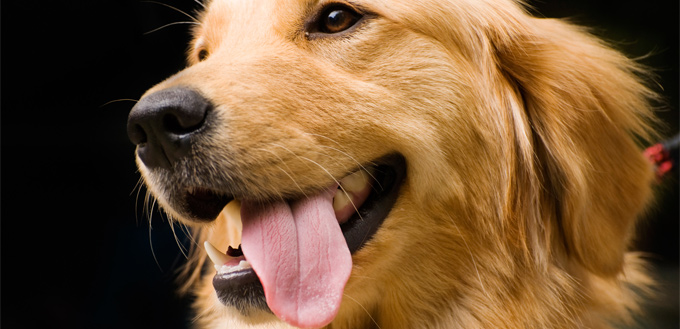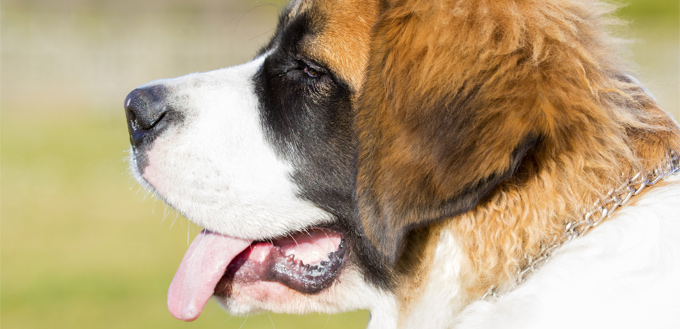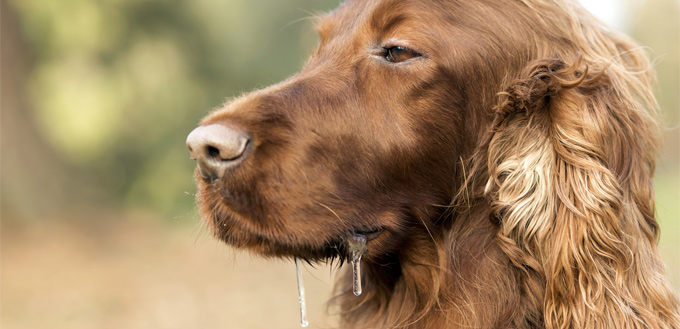All of us want to have happy and healthy dogs. This concern for our canine friends makes us jump even when something is slightly wrong.
One such aspect that causes many owners to stop in their tracks is foam at your dog’s mouth. The good news is, 99% of the time there is nothing to worry about it. But still, it is good to know why your dog’s foam at the mouth. And here’s why.
Overexertion
One of the reasons for your dogs to foam is overexertion. Typically, dogs that exert themselves physically as military dogs tend to have foam often. It is also common to see in your dog too, especially if it has played way more than its routine time.
What happens is, when your dog pants heavily, it takes in oxygen rapidly. In turn, this rapid intake can cause the saliva in its mouth to foam. As a pet owner, you know that your dog salivates more when it expends more energy. This is a part of your dog’s natural mechanism to puff and pant!
Most times, this foam will go away as soon your dog relaxes a bit and its breathing comes down to normal levels. Also, the foam levels increase when your dog starts drinking water and lies down to relax.

Stomach Issues
When your dog eats something that it is not used to, or when it eats something that it doesn’t like, it starts salivating more to get that taste out of its tongue. Some dogs find some tastes highly revolting and they do everything they can to get that taste out of their mouths.
When they start salivating more than normal, they tend to foam at the mouth. This usually goes away by itself when the dogs have gotten that revolting taste out of its mouth. Sometimes, it can lead to nausea as this salivating and foaming can cause the salivary glands to go into overwork mode. Have you ever noticed that you salivate a lot before throwing up? The same is the case with your dog too. It salivates more when it is going to vomit, and this increases foaming.
Again, nothing to worry here too. Just like how you feel better after throwing up, your dog also feels better after it takes out whatever it didn’t like from its digestive system.
However, if nausea persists or if your dog is feeling too sick, it could mean a problem in the digestive tract or stomach, and this requires the help of a vet.
To avoid this situation, it is important you feed your dog the right foods prepared under clean and hygienic conditions. Below are some tips to help avoid stomach problems in your dog and the foaming that comes with it.
- If your serving dry dog food or canned/wet dog food, make sure that it is not kept out in the open for too long.
- Check the expiry dates before serving commercial food to your dog.
- If you’re making dog food at home, make sure you do it on a clean and hygienic surface.
- It is a good idea to keep meat away from fruits and vegetables if you plan to serve them together.
- Always use human-grade meat, and not the meat made for the animal as they tend to contain more preservatives than real meat.
- Use clean bowls for food and water.
- Understand your dog’s allergies, especially to certain foods.
- Some foods like onions are not ideal for dogs.
- If you’re trying a new food, give in small quantities to see if your dog likes it.
Besides this food hygiene, sometimes virus and bacteria can also cause stomach upset. If you think not everything is ok with your dog, get an appointment with your vet.
Stress and Anxiety
Stress and anxiety take a big toll on all living creatures, and dogs are no exception to this rule.
Stress causes dogs to foam at the mouth. Essentially, when dogs are stressed, their automatic reaction is to drool. It is a body function triggered by a nervous reaction. In other words, let’s say you bring a dog from a shelter for the first time. The dog doesn’t know if it should trust you or if it is in a safe place. This uncertainty puts an enormous amount of stress on the dog, and as a result, the dog starts drooling excessively as a way to cope with this stress. In turn, excess salivation leads to foaming at the mouth.
This brings up an important question and one that you should always stay on top of. What causes a dog to become anxious?
Well, here are some possible causes.
- Separation anxiety – One of the biggest causes of stress is separation anxiety, where the dog is scared that you will abandon it.
- Past trauma – Some dogs are abused at home and they finally end up in a shelter. These dogs carry memories of their past trauma for a long time, so anything new like a new place, new person or just about anything else can make them anxious.
- Socialization – Socialization puts a lot of stress on some dogs, depending on their personality. This is a particular problem when as puppies they were denied the necessary social and environmental stimuli. This can cause them to have fear towards the socialization process, and in turn, lead to stress.
- Genetic disposition – Some dog breeds are more prone to anxiety than others. Generally speaking, intelligent dogs that can identify even the smallest of changes in the environment tend to feel more anxious than other dogs. Anxiety also depends to some extent on breeds. Dogs that are most disposed to anxiety include Cocker Spaniels, German Shepherds, Dalmatians, Siberian Huskies, Standard Poodles, and Terriers.
- Medical issues – Dogs with illnesses such as hypothyroidism, encephalitis, and diabetes tend to get more anxious than other dogs because these diseases impact their nervous system, and through it, their ability to handle situations.
If you’re wondering, foaming as a result of these anxieties are the least of your problems. But, you should look at foaming as a possible sign to address the underlying anxiety that plagues your dog often.

Medical Problems
The causes that we saw above have no serious impact on the dog.
But sometimes, foaming is a symptom of a more serious medical condition that requires your attention right away. Some possible medical conditions for which foaming is an underlying cause are seizures and dreaded rabies.
When your dog is having a seizure, it tends to drool excessively that in turn causes foaming. Again, foaming is not an issue here, but then the fact that it signifies a serious condition means you need to provide medical help for your dog right away.
Another dreadful disease for which foaming is a symptom is rabies. In fact, one of the symptoms that vets look for is excess foaming at the mouth followed by erratic behavior. This is because the rabies virus is present in the mouth of dogs, and by the way, this is the reason why humans have to be treated when a dog bites them. So, this rabies virus affects the nervous system of the dog, and this is why you can see a lot of erratic behavior. As a result of this impact on the nervous system, the dog is unable to swallow their own saliva. Hence the saliva gets accumulated in the mouth and the only way to send it out of the system is by drooling and foaming. This is why foaming is such an important characteristic of rabies.
If you see excess foaming in the mouth all through the day for more than a few days, it is a good idea to seek vet care right away.
Dental Health
Another significant health concern for which foaming can be a symptom is dental health.
Poor dental hygiene or problems such as plague, cavities, and gingivitis will cause the dog to salivate excessively. This is a part of the dog’s natural defense mechanism where it salivates to get rid of the germs and the associated pain that comes with dental problems.
But this excess salivation also leads to foaming. As with previous causes, foaming is only an indicator of a larger problem that needs to be addressed.
Here are some things you can do to keep your dog’s dental health in good condition.
- Take your dog for dental exams, at least once every six months. Most vets do a basic dental exam and may refer you to specialists if your dog needs specialized care. Some pet owners are not comfortable with a dental cleaning session as it requires the administration of anesthesia. The only recommendation we have for such pet owners – don’t let your fears affect the oral health of your dog. Talk to the vet about your fears and get it sorted out at the earliest.
- If you sense a musty smell coming out of your dog’s mouth, never ignore it as it could mean that your dog is suffering from some kind of periodontal disease such as gingivitis. Some of these conditions may be painful, so watch out for behavioral changes as well.
- Brush your dog’s teeth as often as you can. Initially, there will be a lot of resistance from your pet for brushing, as it is something new to them and they are not comfortable with it. Start with yummy rewards to your dog, and then slowly, use brushing as a time to bond with your canine friend. Over time, your dog will also look forward to it. And dogs do have a specialized paste, so the paste that we use is not ideal for it.
- Buy dental foods, toys and treats so munching on them can clean your dog’s teeth and prevent the onset of dental problems. This is a good way to promote oral health if you don’t find time to brush often.
You May Also Like: Dog Toothpaste
In all, foaming could be an indicator of dental health, so make sure you take corrective action, especially if you see persistent foaming or when it happens often than before.

Poisoning
A rare, but possible cause is poisoning. If your dog has consumed poison or any cleaning liquid that is mentioned as poisonous, you will see excess foaming at the mouth. Again, this is a defense mechanism as the dog’s body is trying to get the poison out of its body through salivation, and this salivation leads to foaming.
Needless to say, if you suspect that your dog has consumed poison and is foaming as a result of it, contact your local poison helpline or take your dog to the nearest emergency vet clinic right away.
Swallowing Trouble
A tricky cause of foaming is when your dog has trouble swallowing something. This could be because of an infection in the throat or simply because your dog has accidentally swallowed something that it should not and it is obstructing the passage. As a result, your dog is panting and salivating hard to get rid of the substance, and this leads to foaming.
As a pet owner, this cause is a little difficult to find out because you won’t know where to start and what to do.
In general, if you see foaming with difficulty in breathing, this could be the cause. Ask your dog to open its mouth wide and examine the throat and the rear part of the mouth to see if anything is stuck.
So, these are some of the possible causes for foaming at the mouth. As you can see, most of these causes are not serious or scary, so you can let the dog fix it by itself. But, on the other hand, some of them are like rabies and choking.
As a ground rule, if foaming goes away in some time, don’t worry about it. But if the foaming is persistent or recurs often, check with your vet.
Note: The advice provided in this post is intended for informational purposes and does not constitute medical advice regarding pets. For an accurate diagnosis of your pet's condition, please make an appointment with your vet.







